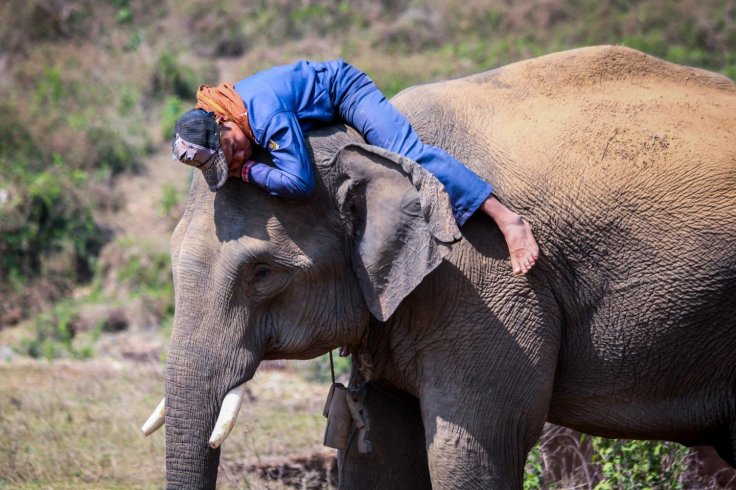
Asian elephants have manifested similar human traits such as attentiveness, sociability and aggressiveness, said researchers after studying a timber elephant population in Myanmar, corroborating with past studies which highlighted their behaviour as a cohesive social group.
The personality differs between individuals and some are braver, more social, or aggressive than others, said lead researcher Martin Seltmann from the University of Turku in Finland. The researchers studied 250 semi-captive timber elephants in Myanmar and discovered that Asian elephants have three different personality factors: Attentiveness, Sociability and Aggressiveness and interestingly, male and female elephants do not differ in these traits.
So far, personality studies have focused on primates, pets and other species that have a relatively short lifespan but elephants have a longer lifespan like humans and the study of their personality traits throws light on several common traits, said Seltmann.
"Attentiveness is related to how an elephant acts in and perceives its environment. Sociability describes how an elephant seeks closeness to other elephants and humans, and how popular they are as social partners. Aggressiveness shows how aggressively an elephant acts towards other elephants," he said.
The elephants work in the timber industry of Myanmar placing logs and they work with their own mahout or master, who are familiar with the behaviour of their elephant very well. "We met elephants that were clearly more curious and braver than others. For example, they always tried to steal the watermelons that were meant as rewards," said Steltmann.
The researchers collected data in Myanmar between 2014 and 2017 based on 28 different traits and the mahouts were asked to assess how often the elephant displayed a particular behaviour on a 4-point scale.
Elephants and humans share several identical characteristics and have a very long lifespan. Elephants give birth to a single calf at a time, who requires the care of the mother and other females for a long time after birth. Above all, "living in complex social environments could be a reason why both species have developed such complex personality structures," explained Mirkka Lahdenperä from the University of Turku, who participated in the study.
Another study on the social life of elephants conducted by Colorado State University earlier showed similar findings that the elephants lead a social structure with a level of complexity that rivals that of human societies.
They studied juvenile female elephants and found that orphans have less access to dominant individuals than non-orphaned elephants, whose primary social partners are their mothers and aunts.
"Previous work in this and other elephant populations has shown that like other social species, elephants strengthen existing bonds if they lose important social partners," said author Shifra Goldenberg, a researcher with Save the Elephants, a nonprofit conservation organization in Kenya.
Elephants are highly expressive, and the friendly interactions include body rubbing and greeting, which reflect the degree to which animals are socially integrated. The team observed little interaction of orphans with mature females while feeding and their findings were published in the journal Scientific Reports in October 2017.









